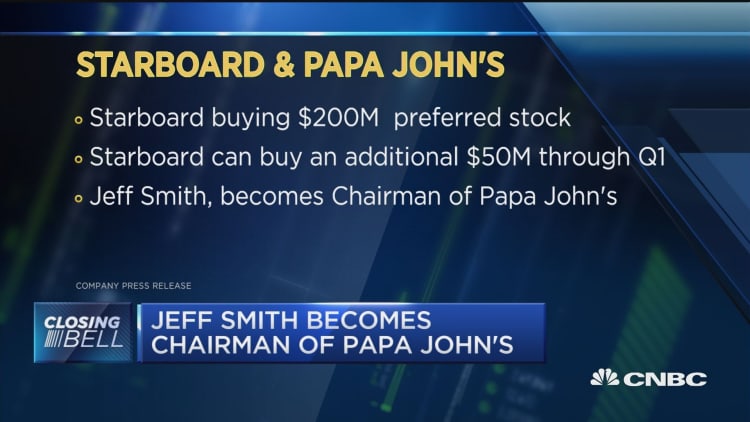Embattled pizza chain Papa John's has struck a deal with activist hedge fund Starboard Value in what it hopes may bring an end to a rocky few months that included a public battle with the chain's founder, John Schnatter.
As part of the deal, Starboard will invest $200 million, which will bring Schnatter's stake in Papa John's down from roughly 30 percent to around 26 percent, according to a person familiar with the situation. It will also install Starboard Chief Executive Jeff Smith, known for his turnaround of Darden Restaurants, on the pizza chain's board as chairman, giving it a powerful defense should Schnatter wish to launch a proxy battle or seek to overturn members of the Papa John's board.

But when Schnatter heard about the proposed deal Saturday, he sent the board his own proposal with similar terms, according to an SEC filing. In addition to a $200 million investment with the option to invest $50 million more in the future, Schnatter offered a lower dividend rate and limited voting rights for the new shares. The special committee rejected the offer.
"The Special Committee unanimously concluded that the Starboard investment was superior to Mr. Schnatter's proposal and that the Starboard investment was in the best interest of all Papa John's shareholders," a company spokesperson said in a statement.
Schnatter voted against the Starboard deal, according to a company spokesman. Other directors were unanimously in favor of Starboard's proposal.
It wasn't immediately clear how Schnatter planned to fund his proposed transaction. He had previously reached out to third parties, either directly or through an intermediary, to explore his own deal for Papa John's, according to SEC filings.
Schnatter also said in Monday's filing that he is also "evaluating the legal remedies available to him."
Wayne University law professor Peter Henning said the board's decision is typically protected from legal action by the business judgment rule, which presumes that executives make decisions in the best interest of the company.
"[Schnatter] would probably have to show a conflict of interest with the board, which isn't easy to do in this situation," Henning said.
Shares of Papa John's jumped 11 percent Monday, but the stock, which has a $1.3 billion market value, is still down nearly 30 percent over the past year.
Last year, Papa John's hired Bank of America Merrill Lynch and Lazard to explore selling the chain. However, the effort was complicated by Schnatter's stake and Papa John's uneven earnings performance. The Starboard stake does not rule out a sale, according to a person familiar with the matter. The deal also gives Starboard the option to invest 50 million more in Papa John's through March 29.
The chain's founder has been locked in a feud with the company ever since he gave up his role as chairman in July. Prior to leaving the company, Schnatter became embroiled in number of public scandals, including his use of the N-word on a conference call that led to calls for boycotts. A poison pill plan put in place by the board after his ouster prohibits him from purchasing more stock until July 2019.
Also Monday, the company reduced its outlook for 2018 earnings to the lower end of the prior range of $1.30 to $1.60. In 2017, it earned $2.51 per share. The public relations crisis primarily hit North American sales, with same-store sales in the region dropping by 8.1 percent in the fourth quarter. In January, they declined even more, falling by 10.5 percent.
Despite its public relations challenges, the restaurant remains a desirable target, should questions around its ownership be resolved, sources say. Pizza is one of the few food items that, like hamburgers, scales well internationally. With sufficient investments in technology, there may be opportunity to revive the brand to echo the resurgence enjoyed by Domino's after its own technology investments.



